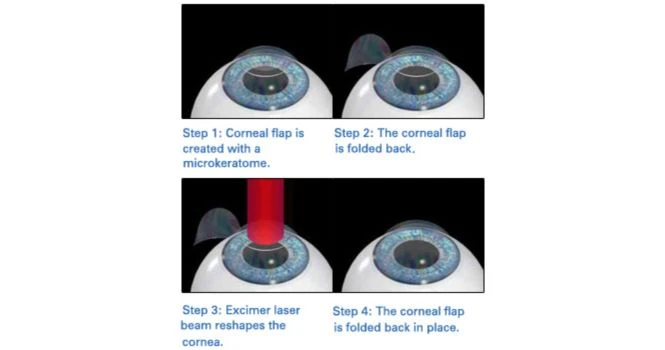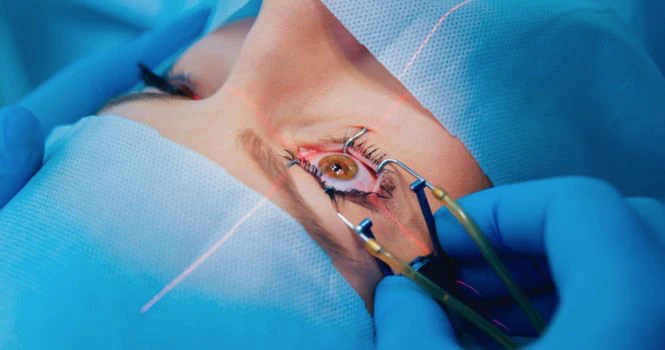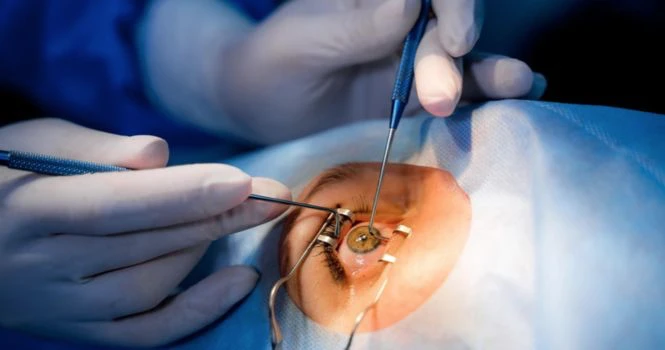What is LASIK?
LASIK is a surgical procedure used to lower an individual’s dependency on spectacles or contact lenses. LASIK stands for Laser-Assisted In Situ Keratomileusis. It is a surgical procedure that changes the shape of your cornea permanently via an excimer (an ultraviolet) laser beam. LASIK surgeries are corrective ones done to the very delicate part of your eyes and treats nearsightedness, farsightedness as well as astigmatism.

How is it done?
Usually, you focus images on your retina when light rays are properly bent. But when you have nearsightedness or farsightedness or astigmatism, the bending of light rays is done incorrectly and ends up focusing the image elsewhere, resulting in blurred vision. Traditionally such errors are corrected using spectacles or contact lenses. But reshaping the cornea itself can solve the issue and it is done using LASIK.
Using a laser beam, your cornea will be reshaped to improve the way your eyes focus light rays onto the retina. Your Ophthalmologist creates a thin flap in the cornea using a blade or a laser beam and then folds back the flap and remove some corneal tissue under the flap via an excimer laser. The flap is then fitted back into its original position and let to heal. It usually heals without the need for any stitches. During the procedure, you will be asked to focus on a point of light and staring at it helps you keep your eyes in a fixed position while the laser reshapes your cornea.
If you’re considering a LASIK surgery, you should have realistic expectations. Here are some key points you should know about LASIK before considering it:
- The surgery is done to a very delicate part of your eye and thereby it cannot be reversed.
- Similar to any other surgery, it is subjected to risks and complications
- Although it has high success rates, it is not recommended for everyone
- You might not achieve perfect vision post the surgery.
- People in their 40s might be prescribed reading spectacles even after undergoing the surgery
- Sometimes, the benefits of the surgery can diminish with time and you might need another surgery to restore the desired results.
- Most of the insurance plans do not cover it
When is LASIK ideal for you?
- When you are aged 18 and above, since the vision of younger ones is still changing.
- When your eye health is good and your prescription has been stable.
- When your general health is good. Not recommended if you have diabetes, rheumatoid arthritis, Glaucoma, herpes infections, cataracts, lupus and/or other eye disorders.
- When you are not a pregnant or nursing woman
- When you are not taking prescription drugs such as Prednisone or Accutane
- When you have never had a history of dry eyes
- When you do not have a family history of keratoconus
- When you do not have severe nearsightedness
- When you do not have extremely large pupils or very thin corneas
- If you do not participate in contact sports associated with blows to your face.
What are the possible risks and complications of LASIK surgery?
- Vision Loss
- Blindness & Irreversible eye damage
- Corneal Inflammation
- Infections
- Severe night vision issues
- The decrease in the sharpness of images
- Severe dry eye syndrome
- Corneal flap issues
How long does the procedure take?
It is an outpatient procedure which takes just 10-15 minutes for one eye. It is performed after administering an anesthetic eye drop which helps numb the eye surface. In some cases, the surgeon might perform the procedure on both eyes, whereas in other cases, they might wait to see the result before proceeding to operate on the other eye.
What to expect after LASIK surgery?
Although you might heal soon, you might need to take a few days off work and refrain from sports and other activities for a month. You might experience the following:
- Mild burning sensation for a few hours post surgery
- Blurred vision on the day of surgery which will considerably improve in the following days
It is recommended that you refrain from swimming and driving until your vision has completely improved. And in case of any unusual side effects, report immediately to your eye surgeon.
What are the alternatives to LASIK surgery?
- Photorefractive Keratectomy (PRK)
- Conductive Keratoplasty (CK)
- Phakic Intraocular Lens (IOL)
If you’re exploring treatments beyond LASIK, consider cataract surgery, a well-established procedure to restore vision affected by age‑related lens clouding. Read our full article on Cataract Surgery.
Advancements in medical technology have made procedures like LASIK and rhinoplasty safer, more effective, and accessible to those seeking appearance or functional corrections.














